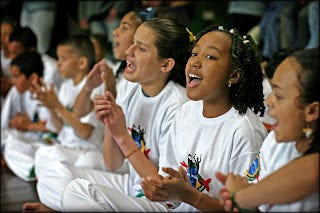Okay. Let’s get right into it.
No song is unsingable.
And the fact that people think that’s true tells me we don’t do enough education around singing in our schools, congregations, and communities.
It is a truth universally acknowledged that of the many things we do naturally, singing is one we absolutely killed as a communal activity. We sidelined the arts in our schools, and we commodified vocal talent (and made it competitive). And those two acts send the message that if you’re not trained, or competitive, or allowed to sing for fun and community building, you shouldn’t sing at all - except maybe alone in the car or in the shower. So then there’s very little casual singing, and certainly very little in public, except maybe the responses to “Sweet Caroline” at a ball game or singing along at a concert with thousands of others where no one can hear you.
When a society doesn’t encourage casual singing, it becomes easy to only sing what you already know. Over and over again.
So when a new song is encountered - especially one that’s not got a familiar pattern or hook, it is deemed unsingable. Because we aren’t in the habit of singing songs and learning new ones that aren’t familiar.
Now I could go on a screed against the 21st century music industry - because the streaming market pushes a particular kind of song that is familiar in shape, and form, and even tonality. It’s amazing how many popular songs sound like so many other popular songs. That wasn’t always true; until the 90s, our pop radio had significant variety; Sergio Mendes’ “Never Gonna Let You Go” is my go-to example of how a complex song could top the charts then but wouldn’t get a second look today1.
But it’s more than that. As we age, we do find ourselves in a comfort zone of music; the songs we grew up with2 and the songs we learned when we first joined a congregation are the ones that we turn back to over and over again.
Yes, it is true that every minister has their go-to hymns - the ones that often think of when considering various topics, or which are ‘utility’ songs that are great whenever you need them. (Unitarian Universalists I’ve preached to have likely heard 128, For All that Is Our Life and/or 1017, Building a New Way - maybe more than once. I’m sorry. Those are my go-to’s.)
But when those are the only hymns you ever sing, and no one is encouraging you to learn new ones - or even helping you learn new ones, well…you get stuck in a rut.
And that means your theology gets stuck too.
Yes. We sing our theology. It’s how we learn our theology, to be honest. It’s how we carry it with us, how we quote it, how we think about it. There’s a reason so many Unitarian Universalists start our prayers with “Spirit of life…” - it rolls off the tongue as easily as the song by Carolyn McDade, which is now beloved among us, does.
So when we limit our singing to only a few songs, we limit ourselves.
And we stay small.
More, we limit the ability of our religious professionals to produce expansive worship experiences. “Oh, we don’t know that” shouldn’t be a signal to not sing it. It’s a signal to open up.
“But how?” you may ask. Ah, here’s where some investment helps. First, find the people who love to sing and ask them to lead hymns. Maybe individually, maybe as a group. Listen to the song the whole way through. Maybe hear the first verse sung and join on the rest. Maybe hear the song performed and later in the month try to sing it. (There are many strategies for helping groups sing - thanks to our music professionals for taking on this work!)
But maybe it’s even more than that. Maybe we can provide all the guardrails you need to learn a new song but you just don’t.
Is that because you don’t want the challenge? You like your comfortable and comforting ten or so hymns, eh?
Well, your religious professionals have read Karl Barth, who said that our role is to comfort the afflicted and afflict the comfortable.
Time to learn some new hymns.
Who knows - they might become your favorite.
Musician and teacher Rick Beato has a great video about this song that’s worth watching - song has like a thousand key changes and more.
Perhaps this is why songs by The Beatles are still so popular in our Boomer-filled congregations…





I completely agree with you. And I also believe in repetition… having some hymns and other spirit songs you know by heart. Ask any group of religious educators what happens when someone starts singing “Come, Come, Whoever You Are” …
The UU hymns are a big reason I've remained affiliated with Unitarian Universalism. I found that at my former church, the music started switching from the hymnal to anthems from Broadway musicals and pop songs. I love musicals and pop songs, but it's not what I want to hear in worship.
A former music director started a lovely practice of regular weeknight gatherings where we sang our way through Singing the Living Tradition. Everyone was welcome to come and sing. As a "non-singer" I loved and felt empowered by this practice. My off-key voice blended in beautifully in a group. One of my core beliefs is that we are more powerful together than individually: the whole is greater than the sum of the parts. Singing is an example of that higher power.